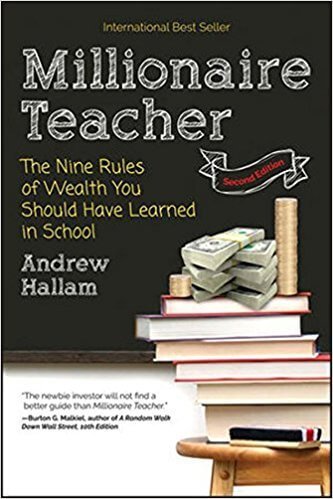 |
Title: Millionaire Teacher |
| Author: Andrew Hallam | |
| Publisher: Wiley | |
| ISBN-10: 8126568054 | |
| ISBN-13: 978-8126568055 | |
| Buy from: Amazon.in | Amazon.com |
Andrew Hallam in this book talks about his journey of how he has an average person with an average salary of a teacher became a debt free millionaire by his late 30’s.
Who is Truly Wealthy?
Hallam distinguishes between ‘Truly Wealthy’ and those that have many costly toys but little money. The surest way to build wealth over a period of time is to spend less than you make. Many struggle with this as they are unable to distinguish between their wants and Needs. An enormous pay check is no guarantee to wealth if you don’t know how to keep it. Let us define wealthy here as per Hallam:
- Never having to Work for Money
- Passive cash flow (from investments, pension, trust fund etc) that is at least twice the median household income in the country
Hallam puts together his learning as 9 rules of Wealth. Lets us look at what the nine rules are:
Rule 1: Spend Like You Want to Grow Rich
Hallam talks about Lease Vs Buy esp a fairly new second hand car which has saved him several $$ over the years. In an Indian context I find its relevance a bit limited, but its a great framework for evaluating big purchases incl Furniture, Appliances, Cars etc. While he managed to sell a few cars more than what he had paid for it, he managed to keep his cost of ownership (Buy price – Sell price/ No. of years used) to the minimum in all even while upgrading his range of cars.
Rule 2: Use the Greatest Investment Ally You Have
Compound Interest, which Buffet declared has the 8th wonder is often the biggest ally for long term investments. Having compound interest work against you is raking up high interest debts like credit cards.
Without going into too many calculations, consistent contributions and compounding can make a huge difference in one’s retirement account. So the early one starts the better it is.
Rule 3: Small Fees pack Big Punches
Financial Industry has long suffered with the problem of incentives. The expert advisors are most often salesmen who have their own over your interest in making recommendations. Hallam goes on to provide several examples where mutual funds with huge management fees have heavily under performed index funds. It is common knowledge that the bankers and financial experts make more money for themselves than for their clients. So if your banker recommends you a top performing fund to get above average returns, always be aware.
Rule 4: Conquer the Enemy in the Mirror
Do not try to time the markets. Contribute consistently into your funds consistently over a period of several years. What matters is time in the market over timing the market itself. Hallam also encourages to buy more during a downturn and not give in to fear and stop SIP.
Rule 5: Build Mountains of Money with a responsible portfolio
Hallam recommends a balancing of portfolio between Stocks and Index. General Thumbrule is to have a portfolio of bonds equivalent to your age and stocks as the rest and balance it at intervals either quarterly, half-yearly or annual. This allows one to take advantage of any temporary fall in the market by increasing the allocation automatically. Bond Index funds are recommended over actively managed bond funds due to its fees.
Rule 6: Sample a “Round-the-world” Ticket to Indexing
Hallam recommends spreading the stock portfolio between a world market index and a home country index (somewhere one intends to retire). This distribution will help the investor ride over country specific risks and also take advantage of participating in growth of emerging economies.
Rule 7: No, you don’t have to invest on your own
Hallam recommends a series of investment options specific to North America (US and Canda). Takeaway is to look for low cost index funds run by reliable fund houses.
Rule 8: Peek inside a Pilferer’s Playbook
This section covers numerous strategies that a bank may use to lure you away from an index fund and encourage you to invest in a Mutual fund or worse fund of funds. in India we have experts that run paid newsletters to do the same. The argument is always around will you fly your own plane or operate your brain. Leave it to the experts who have resources that are not possible for you or me to decide on what and when to invest. The rosy projections seldom are seldom matched by the past numbers.
Rule 9: Avoid Seduction
Once in a while, we will always come across schemes run by individuals that promise an exorbitant return on investment. Many of their fraudulent, some of them involve a much higher risk than one takes in a conventional investment. Hallam strongly discourages one from investing in any of the too good to be true schemes. I would say understand and evaluate the risk independently rather than get carried away by marketing lingo. It is in general better to stay away than risk losing capital.
Critic Review:
A few good tips from the book are on Evaluating spending decisions, Saving early and consistently to take advantage of compound interest, spreading market risks with diversification across geographies, moving from market to debt instruments as you approach retirement and not to fall for sales pitches and too good to be true schemes.
I felt the sole purpose of several of these rules is to just say nothing has worked better than an index investing is US funds and hence is the single best investment for everybody. One things that I have found in market is things that people take for granted for a long period of time, alters behaviors and hence suddenly stops working. Michael Burry, an Hedge Fund Manager and the hero of the movie ‘Big Short‘ has called out index fund investing as a bubble as it hinders the price discovery mechanism that is necessary for the smooth functioning of the stock markets. Who will be right this time, is something only time can tell!!

We know you love books. We would you like to give two FREE audio books. Grab your trial Audible Membership with Two Free Audio Books . Cancel at anytime and retain your books.